Статьи журнала - Сервис plus
Все статьи: 1221
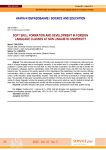
Soft skill formation and development in foreign language classes at nonlinguistic university
Статья научная
This article discusses the topic of formation and development of soft, or interpersonal, skills among students in a foreign language class at non-linguistic university. In the modern world, it is impossible to feel confident in a profession if a person does not have any Soft Skills. It is they that allow a specialist in any field to be able to interact with their employers, colleagues, partners, subordinates, clients. Soft skills are valued no less, and often more than hard, professional ones. The success of any activity depends on this. Regardless of the classification, the main ones are: effective communication, ability to solve problems, time management, customer focus, emotional intelligence, creativity, self-control, conflict resolution, taking responsibility, empathy. These skills can be formed at university in a foreign language class. The examples of tasks given successfully solve the problem of forming not only the basic competencies in the discipline of a foreign language, but also the necessary soft skills. Group work is noted as a way for students to interact with each other. As a result, those graduates who are with soft skills are preferred in the modern labor market.
Бесплатно
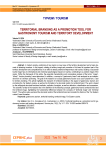
Territorial branding as a promotion tool for gastronomy tourism and territory development
Статья научная
In modern society, positioning of any region is a key issue of the territory development and a basic element of attracting investors. In this regard, creating a territory image and promotion of its brand is important part of the territory development and competitiveness in an effort to attract potential entrepreneurs and tourists. Building a successful tourist image has an informational and emotional-psychological impact on tourists, contributing to a positive image of the region. Within the framework of this article, the essential characteristics and comparative analysis of the terms: “image”, “brand”, “territory branding” were determined. In addition, a concept of “gastronomy brand” was analyzed as an independent form of a territory promoting. The goal of the research is to study gastronomy tourism as a socio-cultural form, a tool for territory branding. This article highlights the research of territorial branding in the aspect of gastronomy tourism and promoting the Far Eastern cuisine, as well as the formation of a structural model of a territorial brand. The work is based on the axiological structural-functional methods, methods of analysis, as well as deduction, classification and comparison. The scientific novelty of the research lies in the definition of the following concepts: gastronomy brand, territorial brand and the territorial image, highlighting the fundamental difference between the concepts of “territorial image” and “territorial brand”. The authors also examined the structural model of the territorial brand and consider the factors of the “Far Eastern cuisine” brand formation.
Бесплатно
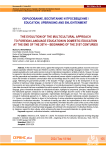
Статья научная
At the end of the 20th century, against the background of rapidly expanding political, economic and socio-cultural cooperation between Russia and Western countries, interest in learning foreign languages increased. The country needed specialists who could quickly become involved in international cooperation in all fields of activity. However, the need to prepare for intercultural communication revealed the insufficiency of existing approaches to teaching a foreign language, and the grammatical and translation orientation of the educational process required a significant transformation in order to ensure the formation of students' communication skills and knowledge about the culture of the country of the studied language. Rethinking the goal-oriented priorities of the discipline "Foreign Language" led to the development of new approaches to teaching a foreign language, an important of which was the multicultural approach. The paper characterizes the economic and socio-cultural factors of the emergence of a multicultural approach to teaching foreign languages, analyzes state documents that have consolidated the need to expand the cultural component of the process of learning a foreign language, gives a theoretical description of multicultural education, highlights its components, principles, interpretations of the multicultural approach, analyzes its role in obtaining cultural knowledge about the country of the studied language, necessary for productive international cooperation, implementation technologies are shown. The main provisions of the concept of multicultural approach by V.I. Mathis, as well as the concept of linguistic multicultural education developed by P.V. Sysoev, are studied. Attention is drawn to the functioning of various educational organizations that contribute to the development of multicultural education. The methods of teaching are called, the implementation of which will contribute to the formation of not only language skills, but, no less importantly, information about the culture of the country of the studied language on the indispensable basis of knowledge about the native culture. The authors conclude that the implementation of a multicultural approach to teaching foreign languages will contribute to the development of multicultural thinking, humanity, tolerance, respect for other cultures, which will become the basis for successful interaction in a global society.
Бесплатно
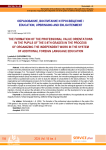
Статья научная
In this article we tried is to determine the priority of the main organisational and methodological provisions in order to form the professional value orientations among schoolchildren in additional education (in the process of learning a foreign language (FL)). The research methodology is based on the axiological, personal-activity and professionally oriented approaches to preparing students to enter the university. The main methods of the research are theoretical and methodological analysis (study and analysis of the normative documents, the innovative pedagogical experience), the diagnostic method (a questionnaire survey) in order to study the attitude of schoolchildren to the future profession. The main organisational and methodological provisions for the formation of the professional-value orientations in the pupils of additional foreign language education (AFLE) are the creation of a psychologically comfortable microclimate at the FL class for the formation of pupils as a moral person with clear life guidelines. We also used the axiological approach to the selection of FL content taking into account the principles of the humanistic orientation, the professional orientation and the educational intentions. We took into account the activation of the communicative interaction; and the development of a new approach to the formation of the professional-value orientations in the pupils of AFLE.
Бесплатно
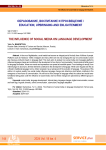
The Influence of Social Media on Language Development
Статья научная
In the era of digitalization, social media has become an integral part of the daily lives of billions of people. Platforms such as Facebook, Twitter, Instagram and many others are not only changing the way we communicate, but are also having a profound impact on language itself. This study aims to analyze how social media and messaging platforms influence language change and contribute to the development of new forms of communication. Social media is fertile ground for language innovation, where new words and expressions can spread at incredible speed. From hashtags to emojis, from internet jargon to acronyms, all these elements contribute to the development of language. While some linguists see this as a threat to traditional language norms, others recognize it as a natural part of the evolution of language. The purpose of this article is to explore exactly how social media influences language change and determine what factors contribute to the emergence of new forms of communication. We will look at how changes in language reflect the cultural and social transformations taking place under the influence of social media, and how these changes are perceived by different groups in society.
Бесплатно
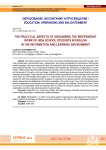
Статья научная
This article is devoted to the new trends in the modern educational process aimed at the formation of the most important skills of schoolchildren today - independence. Such trends are explained by the importance of training highly qualified specialists. High school students who have fully mastered the skills of independence are more successful in their future professional activity. Thus, the educational institutions that emphasise the development of independence in schoolchildren, fulfill the social order of the state training future specialists, which is necessary for the active development of society and the success of the country on the world stage. In addition, the modern learning process involves the active use of the information technologies. Today a teacher not only teaches children using textbooks, but also introduces them to the world of information and communication technologies (ICT), teaches them how to work with computers, which is also extremely important for their future professional activity. Nowadays, it is important for the general education school graduates to possess the relevant skills and abilities that will make them competitive in the modern society. Thus, at school, teachers develop students' independence, and at the same time children learn self-organisation and reflection, as well as self-control. Thanks to such work, future graduates master the necessary skills of working with a personal computer, fully know how to create presentations, as well as make personal projects of various formats.
Бесплатно
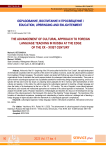
Статья научная
At the end of the XX - beginning of the XXI century after the fall of the "Iron Curtain", the rapid development of international cooperation with the countries of the world in the political, economic, social and cultural spheres actualized the knowledge of foreign languages. The education system was tasked with finding new ways of learning and new ways of organizational forms of education that could prepare students for subsequent intercultural communication. There was an opinion that the culturological approach has a qualitative potential for transforming foreign language teaching, and its subspecies will help solve some key issues on preparing future graduates for life in harmony with representatives of other cultures and peoples. In this article, the authors analyze the culturological approach to teaching a foreign language and show the history of its development at the turn of the XX - XXI century. The role of linguistic, cross-cultural approach, intercultural, socio-cultural and multicultural approaches as invariants of the cultural approach is emphasized. The authors analyze the scientific works of Russian researchers, methodologists and teachers who focus on the development and significance of the cultural approach in the framework of the study of the discipline "Foreign language". The importance of the formation of intercultural competence, knowledge and understanding of another culture as a strategic task of teaching a foreign language in higher education within the framework of a culturological approach is emphasized.
Бесплатно
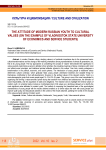
Статья научная
In modern Russian culture, studying values is of particular importance due to the pronounced socio-cultural transformations and the change of life-meaning orientations among representatives of almost all generations, but, first of all, young people. The key approaches to considering the concept of “values” demonstrate their significance in various periods, determining a person’s attitude to their activities, the prevailing meanings of being, compliance with moral and ethical social principles, and traditional spiritual attitudes inherent in the culture. Over time, society undergoes a transformation in the political, economic, and social spheres. The introduction of young people to traditional values determines cultural continuity, which gradually helps young people understand essential and valuable things for themselves, contributing to their self-development, focusing on the spiritual values of the relevant society. Youth is a socio-demographic group that covers people aged 14-16 to 25-35 years. This group is one of the most complicated in organizing and forming a value-semantic sphere during the transition from childhood and adolescence, the formation of social responsibility, and the acquisition of rights and obligations. The research aims to highlight the terminal values of modern youth. An empirical study involving a morphological test of life values as a technique allowed us to identify the most significant value attitudes for modern youth. The method of comparing the theoretical basis of the psychological characteristics of young people with the results obtained enabled us to further adjust the work with young people and improve youth policy and educational activities in the context of the results obtained, justifying the novelty in the changes in the value-semantic sphere of modern youth.
Бесплатно
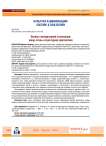
The groundwork of literary stylization: genre, style, and cultural pragmatics
Статья научная
The purpose of the best aesthetically valid translation of a poetic work can be best achieved through stylization. From the linguistic point of view stylisation is “an imitation of a manner, or narrative style, etc, typical of some genre, social milieu, time in history, etc, usually aiming at creating an impression of authenticity” (Akhmanova, 1969). Normally a writer, aiming at creating the said effect, never tries to reproduce an exhaustive set of the peculiar genre features of imitated text, but thinks in terms of the “necessary and sufficient” amount of conceptually and linguistically specific features bearing the main load in creating a particular effect. A researcher, whose task is to reveal these features, should probably begin by making a complete list of stylistic devices used by the author, and then consider their relative functional significance in producing a desired impact. The results of such study appear to be of a high practical value for a translator, who invariably faces the problem of the balance between conceptually significant elements and emotional-expressive “decorators”.
Бесплатно
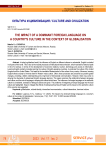
The impact of a dominant foreign language on a country’s culture in the context of globalisation
Статья научная
In today's globalized world, the influence of English on different cultures is undeniable. English is studied in all parts of the world. This is due to the natural processes of intercultural interconnection, which reached its historical peak in the 21st century, in terms of the development of economic relations, tourism, technology and access to information. Learning English certainly includes learning the culture of English-speaking countries, in particular the culture of the United Kingdom and the United States. This leads to the inevitable Westernization of the culture of any country. Moreover, learning English allows society to immerse itself in Western mass culture. Often, these processes are perceived as positive global changes, providing a better understanding and a high level of intercultural communication. However, there may come no denying the downside of widespread English language learning. This paper examines the relationship between language and culture, and the role of language in shaping the cultural ethnic base. The influence of a foreign language on the authentic culture is considered, examples of bilingual cultures are given. The problems of integrating a foreign language into the local culture are highlighted. Ways to mitigate the effects of widespread learning of English and its impact on the authentic culture of the country are suggested.
Бесплатно
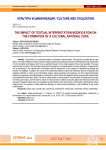
The impact of textual interpretation modification on the formation of a cultural national code
Статья научная
The society is in a continuous process of formations transformation. This process is conditioned by many factors. Formation shifting in modern society is mainly caused by the growing processes of informatization and development of communication technologies, which have a significant impact on the cultural aspect of the social mentality. This paper examines the concepts of the information society and its impact on the cultural aspect of human civilization. It discusses the role of technology in the transmission of information and the importance of sign systems in facilitating the storage and transfer of knowledge. In addition, the nature of the relationship between culture and information flows is emphasized and explained, attention is drawn to how information shapes cultural processes and practices, and how cultural frameworks influence the generation and dissemination of information. Moral, ethical and aesthetic factors governing the dissemination of information are examined in detail. The role of cultural values in communication, the importance of cultural texts as carriers of meaning and values, and the dynamic nature of cultural values in relation to specific cultural and historical contexts are discussed. Classical cultural texts are considered as a benchmark for the transmission of information containing the cultural national code. The question is raised about the distortion of cultural texts interpretation in the conditions of the society informatization.
Бесплатно
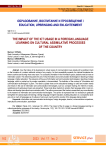
Статья научная
Over the history of its development, virtual means of communication have already left a significant mark on the formation of a modern authentic culture of any country. As their accessibility expands, the cultural boundaries between countries are blurring more every year. For successful orientation in the information space, students need to have an information culture. The article discusses the use of new information and communication technologies in teaching a foreign language in higher education. The relevance of the use of information and communication technologies in teaching a foreign language, which is pointed out by modern specialists, is demonstrated. The definition of the concept of "information and communication technologies" is given. The need to update views on the educational strategy is noted and modern trends and means in the use of information and communication technologies, such as: computer training, the Internet, e-books, audiobooks and audiovisual means are presented. These tools allow students to practice their language skills in real conditions and develop intercultural communication skills. The authors recommend that modern researchers pay more attention to the research of information and communication technologies. The opinion is expressed that it is necessary to gradually strengthen the cultural aspect of learning a foreign language in higher education, building education on a comparative analysis not so much of languages as of cultures of one's own country and the country of the language being studied.
Бесплатно
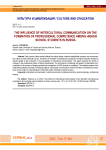
Статья научная
Each country's labor market reflects the cultural values, historical established concepts, and communication culture of each individual country. Therefore, the formation of professional competence of higher education students is directly related to the immersion in the peculiarities of intercultural communication. This paper examines the trends of changes in the professional culture of future professionals. The importance of mastering the aspects of intercultural communication in the process of shaping professional competence of HSE students is considered. The detailed analysis of the relationship between the study of individual subjects, intercultural communication and the formation of professional competence in the context of cultural features of the labor sphere of foreign countries is given.
Бесплатно
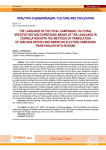
Статья научная
In the modern world politics play an immensely important role, determining social, economic, humanitarian and cultural development of countries. Democratization of state institutions and rapid development of information technologies, have created new ways for citizens to participate in the political life of the country. This function is executed by political advertising. To meet the many different needs that contributed to the emergence of the phenomenon of political advertising, and due to the development of new technology, the media and the Internet, rapid, widespread changes in political advertising have occurred, it has actualized and new types and classifications have appeared. In the context of globalization, when people from different parts of the world and cultures are becoming closer to each other, there is a need to reduce the communication gap by studying the worldview of people who speak different languages. This is facilitated by quality translation that takes into account all the subtleties of highly imaginative texts, which include political advertising. The aim of the study is to find ways to translate political speeches into Russian preserving the style and linguocultural peculiarities of political texts of various genres, while retaining their semantic and pragmatic functions. The subject of the study is linguocultural peculiarities of political campaings, explicit and implicit means of presenting information, linguistic ways of achieving perlocutionary effect and suggestive methods of manipulating public opinion, as well as various methods of translating political advertisements of different genres from English into Russian without loss of imagery or layers of meaning. The object of the study is political advertising in the US and UK in years 2000 to 2020. Included in this article are some of the examples of the use of culture-specific elements in different genres of political advertising in the US and the UK and their translation, which are part of a larger ongoing study by the same author.
Бесплатно
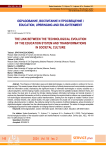
Статья научная
The influence of information space and digital technologies on cultural evolution is profound in the contemporary era. This research paper delves into the dynamic evolution of cultural phenomena and communication processes within the information society, emphasizing the significant impact of information technologies on culture, education as a cultural subsystem, and the shaping of public consciousness. Through a blend of qualitative analysis, literature review, and case studies, the study aims to unravel the intricate interplay between information technology and cultural dynamics. It explores key theoretical frameworks put forth by scholars and delves into empirical data to enhance our comprehension of how technological advancements impact cultural transformations. Drawing from the insights of notable Frankfurt School thinkers, semiotic theories, and cultural studies, the paper underscores the pivotal role of communication processes in molding cultural dynamics. In addition, the problems arising from the evolution of artificial intelligence, active introduction of digital technologies in education from the cultural approach point of view are considered. The vector of changes acceptable in pedagogical approach for better adaptation to changing external conditions is proposed.
Бесплатно
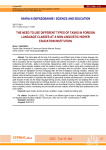
Статья научная
This article deals with the topic of the necessity to use different types of tasks in foreign language classes at a non-linguistic university. In such a rapidly changing world, it is important to train a specialist in any professional field in accordance with the requirements of modern society and business environment. It is possible to form important professional and soft skills - ability to communicate, independence, ability to work in a team - in the foreign language classes in a higher education institution under the condition of using a variety of tasks, relying both on teaching aids and developing ones adapted to a particular group of students in accordance with the curriculum. Factors influencing the choice of tasks are highlighted: the level of language skills, the level of intelligence, learning motivation, creativity, adequate self-esteem of students. The main types of tasks according to the aspects of foreign language learning are distinguished: aimed at teaching receptive (reading, listening), productive (speaking, writing) types of speech activity, as well as those aimed at the formation of vocabulary and mastery of grammatical structures and phenomena. It is important to integrate all types of tasks into the foreign language learning process, clearly structuring them and adapting them to each group of students while implementing an individual approach. As a result of proper planning, lesson structure, selection and structuring of tasks in different formats, excellent results can be achieved not only in building communicative competence in students, but also in developing hard and soft skills and their creativity, which will help future professionals in their future careers.
Бесплатно
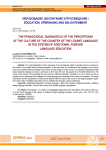
Статья научная
The world globalisation and the expansion of the international relations inevitably lead to an increase in the number of the people learning foreign languages. At the same time, the knowledge of the language of one country cannot be complete without knowledge of the culture and the traditions of this country. It is especially important that high school students preparing to choose a profession in their future life have the opportunity to immerse themselves in the culture of the country of the language they are studying. Additional education, provided in or out of school, can be an excellent tool for expanding the knowledge of a foreign language and immersing in the culture of its speakers. This article will examine how the acquaintance of high school students with the culture of the country of the target language is organised in the system of additional education and how it affects their linguistic cultural competence.
Бесплатно
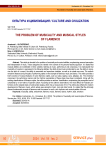
The problem of musicality and musical styles of flamenco
Статья научная
This article is devoted to the problem of musicality and musical abilities, emphasizing personal perception and interpretation of music. These categories are viewed in the context of the personal-activity approach. It is stated that musical abilities are manifested in three varieties: listening to music, performing it and composing. It is emphasized that musicality of a person is expressed in the following abilities: the ability to feel music emotionally by ear, the ability to recognize the pitch of a sound, the ability to remember and reproduce melodies, as well as to create new ones. The authors reveal the features and principles of performing styles on the example of flamenco music and dance. The article provides a brief overview of musical features of some flamenco styles, such as solea, sigiriya, cana, allegrias, etc. The emotional component, the performing manner and the rhythmic peculiarities of these styles have been considered. Along with the existing classifications of flamenco styles, the article provides an authors’ classification, emphasizing the perception level of complexity by a non-native of Spanish culture. According to the authors' observations, the most difficult for Russian performers are the original styles of cante jondo singing, which has a musical size of 3/4. The article also reflects the modern development of flamenco music, which widely uses elements of jazz, rock and other trends. It is stated that the ethnically diverse fundamental principle of flamenco was the reason for such a rich rhythmic and musical palette of this art.
Бесплатно
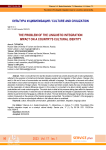
The problem of the linguistic integration impact on a country's cultural identity
Статья научная
There is no doubt that in the last few decades mankind has evolved along the path of active globalization, reflected in the expansion of contacts and interaction between peoples and the integration of their cultures. Changes in the world, in life and in forms of communication are inevitably reflected in language. The integration of economic and cultural areas leads to socio-cultural convergence and, as a result, to the enrichment of cultures through the natural processes of absorption of elements of foreign cultures. The increase in cultural and direct contacts makes the issue of cultural identity and the preservation of cultural differences relevant. In this context, it is important to be able to identify peoples' cultural particularities and to seek mutual recognition. This article looks in detail at the processes taking place within the framework of intercultural communication. It raises the issue of maintaining cultural identity and integrity in a globalized world. Particular attention is paid to the role of language as a reflection of culture. The main tendencies of language changes due to a growing number of loanwords on the example of the Russian language are described. The problem of "pollution" of the language by notions that do not have an etymological reflection in the national culture is considered.
Бесплатно
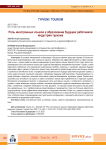
The role of foreign languages in education of future tourism industry employees
Статья научная
In terms of ongoing globalization and rapid development of the tourism industry in Russia it is especially important to analyze the role of specific skills required for effective work in the sphere of tourism. One of them is advanced communication skills in foreign languages. The present article aims to analyze the role of foreign languages in training of Bachelor students in tourism and offer possible ways of solving current problems connected with language skills of future tourism industry employees. The importance of this topic is explained by a growing role of foreign languages, especially English, in the professional activity of future tourism industry employees and a lack of language skills required by their prospective employers. Current problems connected with language training of Bachelor students in tourism are analyzed. A multi-faceted role of English as one of the most popular languages in the world is described in application to the tourism industry. The research methodology is confined to assessing the role of foreign languages, especially English, in tourism, as well as identifying current problems in language education of students in tourism which are reflected in recent publications on this topic. It is proved that good knowledge of foreign languages has both universal and professionally-specific advantages, such as a higher probability of job placement and more effective communication with prospective clients. Furthermore, advanced communication skills in foreign languages allow employees to go on individual or incentive tours, improve their knowledge of tourist destinations recommended by them and expand the activity of tourism companies outside our country.
Бесплатно

